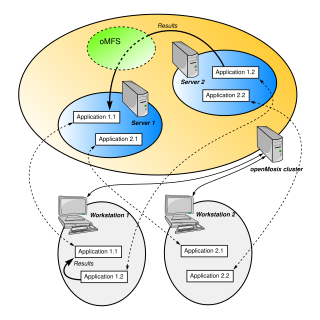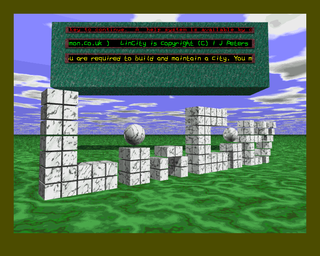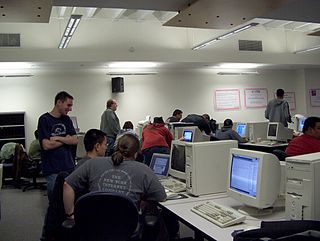Darwin is the core Unix operating system of macOS, iOS, watchOS, tvOS, iPadOS, visionOS, and bridgeOS. It previously existed as an independent open-source operating system, first released by Apple Inc. in 2000. It is composed of code derived from NeXTSTEP, FreeBSD, other BSD operating systems, Mach, and other free software projects' code, as well as code developed by Apple.

GNOME Evolution is the official personal information manager for GNOME. It has been an official part of GNOME since Evolution 2.0 was included with the GNOME 2.8 release in September 2004. It combines e-mail, address book, calendar, task list and note-taking features. Its user interface and functionality is similar to Microsoft Outlook. Evolution is free software licensed under the terms of the GNU Lesser General Public License (LGPL).

ibiblio is a "collection of collections", and hosts a diverse range of publicly available information and open source content, including software, music, literature, art, history, science, politics, and cultural studies. As an "Internet librarianship", ibiblio is a digital library and archive project. It is run by the School of Information and Library Science and the School of Journalism and Mass Communication at the University of North Carolina at Chapel Hill, with partners including the Center for the Public Domain, IBM, and SourceForge. It also offers streaming audio radio stations. In November 1994 it started the first internet radio stream by rebroadcasting WXYC, the UNC student-run radio station. It also takes credit for the first non-commercial IPv6 / Internet2 radio stream. Unless otherwise specified, all material on ibiblio is assumed to be in the public domain.

Privoxy is a free non-caching web proxy with filtering capabilities for enhancing privacy, manipulating cookies and modifying web page data and HTTP headers before the page is rendered by the browser. Privoxy is a "privacy enhancing proxy", filtering web pages and removing advertisements. Privoxy can be customized by users, for both stand-alone systems and multi-user networks. Privoxy can be chained to other proxies and is frequently used in combination with Squid among others and can be used to bypass Internet censorship.

openMosix was a free cluster management system that provided single-system image (SSI) capabilities, e.g. automatic work distribution among nodes. It allowed program processes to migrate to machines in the node's network that would be able to run that process faster. It was particularly useful for running parallel applications having low to moderate input/output (I/O). It was released as a Linux kernel patch, but was also available on specialized Live CDs. openMosix development has been halted by its developers, but the LinuxPMI project is continuing development of the former openMosix code.

FileZilla is a free and open-source, cross-platform FTP application, consisting of FileZilla Client and FileZilla Server. Clients are available for Windows, Linux, and macOS. Both server and client support FTP and FTPS, while the client can in addition connect to SFTP servers. FileZilla's source code is hosted on SourceForge.

Lincity is a free and open-source software construction and management simulation game, which puts the player in control of managing a city's socio-economy, similar in concept to SimCity. The player can develop a city by buying appropriate buildings, services and infrastructure. Its name is both a Linux reference and a play on the title of the original city-building game, SimCity, and it was released under the GNU General Public License v2.

Lazarus is a cross-platform, integrated development environment (IDE) for rapid application development (RAD) using the Free Pascal compiler. Its goal is to provide an easy-to-use development environment for developing with the Object Pascal language, which is as close as possible to Delphi. It is free and open-source software with different parts released under different software licenses.

Xming is an X11 display server for Microsoft Windows operating systems, including Windows XP and later.

GForge is a commercial service originally based on the Alexandria software behind SourceForge, a web-based project management and collaboration system which was licensed under the GPL. Open source versions of the GForge code were released from 2002 to 2009, at which point the company behind GForge focused on their proprietary service offering which provides project hosting, version control, code reviews, ticketing, release management, continuous integration and messaging. The FusionForge project emerged in 2009 to pull together open-source development efforts from the variety of software forks which had sprung up.

Mercurial is a distributed revision control tool for software developers. It is supported on Microsoft Windows, Linux, and other Unix-like systems, such as FreeBSD and macOS.

The Linux Foundation (LF) is a non-profit organization established in 2000 to support Linux development and open-source software projects.
Betavine was an open community and resource website, created and managed by Vodafone Group R&D, for the mobile development community in order to support and stimulate the development of new applications for mobile and Internet communications. The Betavine website allows developers to upload and profile their alpha-stage and beta-stage applications, provides interaction tools for members to share knowledge and give feedback on apps, and discuss topics in mobile. Betavine also contains a growing resources section with technical topics and APIs.
The following outline is provided as an overview of and topical guide to free software and the free software movement:

A Linux User Group or Linux Users' Group (LUG) or GNU/Linux User Group (GLUG) is a private, generally non-profit or not-for-profit organization that provides support and/or education for Linux users, particularly for inexperienced users. The term commonly refers to local groups that meet in person but is also used to refer to online support groups that may have members spread over a very wide area and that do not organize, or are not dependent on, physical meetings. Many LUGs encompass FreeBSD and other free-software / open source Unix-based operating systems.

SOFA Statistics is an open-source statistical package. The name stands for Statistics Open For All. It has a graphical user interface and can connect directly to MySQL, PostgreSQL, SQLite, MS Access (map), and Microsoft SQL Server. Data can also be imported from CSV and Tab-Separated files or spreadsheets. The main statistical tests available are Independent and Paired t-tests, Wilcoxon signed ranks, Mann–Whitney U, Pearson's chi squared, Kruskal Wallis H, one-way ANOVA, Spearman's R, and Pearson's R. Nested tables can be produced with row and column percentages, totals, standard deviation, mean, median, lower and upper quartiles, and sum.
Linaro is an engineering organization that works on free and open-source software such as the Linux kernel, the GNU Compiler Collection (GCC), QEMU, power management, graphics and multimedia interfaces for the ARM family of instruction sets and implementations thereof as well as for the Heterogeneous System Architecture (HSA). The company provides a collaborative engineering forum for companies to share engineering resources and funding to solve common problems on ARM software. In addition to Linaro's collaborative engineering forum, Linaro also works with companies on a one-to-one basis through its Services division.
Besides the Linux distributions designed for general-purpose use on desktops and servers, distributions may be specialized for different purposes including computer architecture support, embedded systems, stability, security, localization to a specific region or language, targeting of specific user groups, support for real-time applications, or commitment to a given desktop environment. Furthermore, some distributions deliberately include only free software. As of 2015, over four hundred Linux distributions are actively developed, with about a dozen distributions being most popular for general-purpose use.











